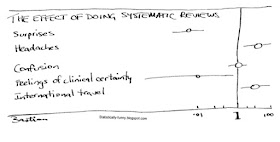Could we evidence our way to a better research ethics system? A bit more formal evaluation has always seemed to me like a very good idea. When I posted the version of this cartoon in 2012, though, I didn't know of any controlled evaluation - despite the critical importance of research ethics and the potential for ethics regulation processes to do harm themselves.
I updated the cartoon when I saw a controlled study related to research ethics for the first time. Mary Dixon-Woods and colleagues studied adding an ethics officer. They wanted to know if that could make the process more efficient and improve the quality of outcomes.
It didn't go exactly according to plan - 31% of the time there was no contact between the ethics officer and the committee before the meeting. There wasn't an appreciable impact on outcomes - and it didn't speed up the process either. Hats off to all concerned: we're a little less ignorant about research ethics committees than we were before.
Dixon-Woods cited a scoping review that showed how thin on the ground solid knowledge about what could make research ethics review more reliably effective. Here's hoping this new study spurs copycats!
Disclosure: I spent years on national research ethics committees in Australia, but don't on any now. I am a member of the human ethics advisory group for PLOS One, and was a member of the BMJ's ethics committee for several years.
Update: 3 September 2016


